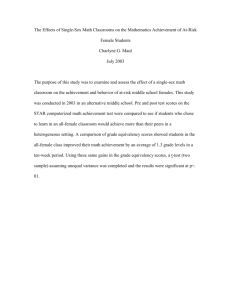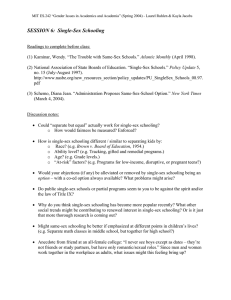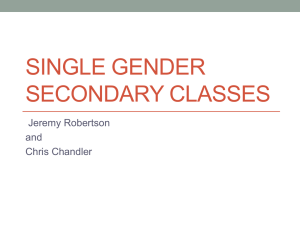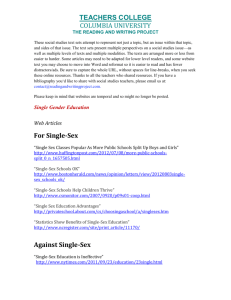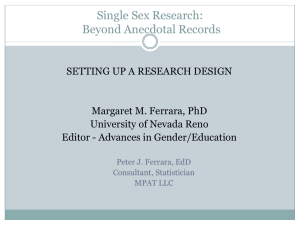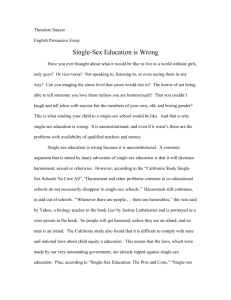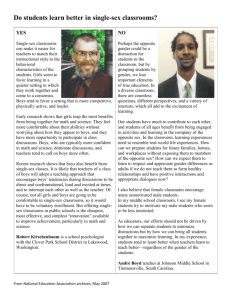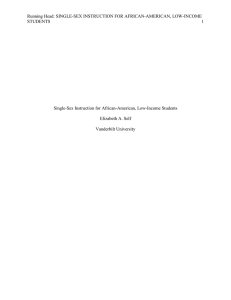? A Cabinet-Level Office of Social Science Advisors: Diane F. Halpern, PhD
advertisement
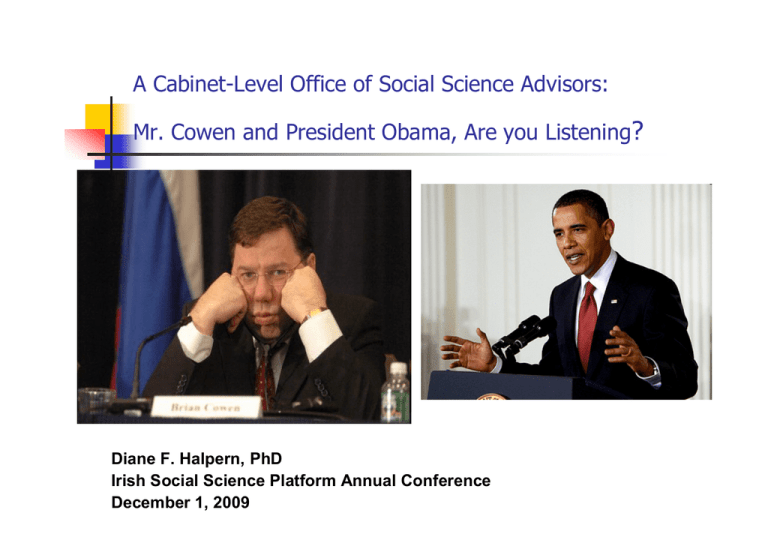
A Cabinet-Level Office of Social Science Advisors: Mr. Cowen and President Obama, Are you Listening? Diane F. Halpern, PhD Irish Social Science Platform Annual Conference December 1, 2009 Underlying Assumption: Social Science Improves Quality of Life Public Policies as Applied Social Science (Hypothesis Testing 101) Identify social issues that can be addressed with public policies Propose policies that are likely to work by extrapolating from relevant research Evaluate policies to determine how successful they are at achieving some goal Use data to direct changes in policies to make them better at achieving a goal Applying the Tools of our Trade— Research and Statistical Methods to Answers Real World Questions People Care About How should we restructure social security for the changing demographics of this century? What is a good way to ensure homeland security? Are working mothers the cause of juvenile delinquency? Does sex education cause promiscuity? Do all the “girls” get prettier at closing time? Will “No Child Left Behind” achieve that goal? Can We? Should We? Have We? Yes, we can improve decision-making with quality data Yes, If we don’t do it, who will or who should? Why do we engage in research on important social issues if we don’t want that research to be used? Yes, there is a long history of using psychological and other social science research to inform public policies, especially when the issues are politically-sensitive. A Famous Example from US— Brown v. Board of Education Did Psychologists Overstep their Data to Advance a Social Reform Agenda? A Bridge Over Troubled Water(s) There is a social problem—let’s say the distressingly low high school graduation rate or large number of people without health insurance There are data that suggest (cost-effective) ways to solve these problems Public policies that utilize our data and theories will act as a “bridge’ over societies “troubled water(s)” Tower of Babel Public policies (at the broadest levels) are made by politicians We talk to each other in a common language, but often come away with little or no shared meaning. We are like the mere mortals who attempted to build a tower that would reach into the heavens. According to the Biblical story, God confused the builders by giving them each their own language so that they could not communicate and complete this project. A Case Study: I couldn’t make this stuff up We are facing “grand challenges” in national security, health care, energy, and the environment. “The social sciences have more immediate relevance to America’s problems than the other sciences” (Brian Baird, D-WA, who is also a psychologist) For example, consider the testimony provided to the U. S. House Committee on Science and Technology regarding “The Contributions of the Social Sciences to the Energy Challenge (Cialdini, September 25, 2007) How Social Norms Influence Energy Consumption 4 conditions—(a) You will save money; (b) save natural resouces; (c) be socially responsible; (d) your neighbors are saving energy; (e) save energy—no reason Everyone believed that (d) would be least influential on them Only (d) led to a significant reduction in energy conservation. How Social Norms Influence Energy Consumption Do you reuse towels when staying multiple nights at a hotel? Would it matter if someone told you that a majority of guests do? 4 messages—(a) Help save the environment. (b) Help save the environment for future generations. (c) Partner with us to help save the environment. (d) Join your fellow citizens in helping to save the environment. You may be thinking, so far so good, but wait Kay Bailey Hutchinson, chair of relevant Senate Committee has decried NSF funding for social and behavioral research. Senator Coburn objects to funding political science research because it is “socially useless and it is not science.” Many legislators and others misunderstand social science research. Mind Control—scary stuff Spin—advocating mind control Social science research only tells us what we already know, so it is useless and Frightened that it will lead to 1984 type mind control A Personal Example: My plan for testimony to the United States House of Representatives Committee on Science Human cognition is an empirical science with a solid theoretical basis The scientific basis should be central to education reform, but there is an unfortunate schism between the laboratory scientists and the applied practitioners who often viewed laboratory work as artificial We need to apply the science of learning and wed the two traditions Lesson 1: Not too much data, it confuses and bores them Just a little data 455 892 789 Lesson 2: Public Policies are Often Made by Anecdote Most people would rather base their decisions on stories about people they know than a bunch of strangers. Lesson 3: Political philosophy is often stronger than science Hot topics—too hot for politicians Evolution Global warming Child care policies Obesity HIV/AIDS Same-sex marriage An Example: Single-Sex Schools Consider researchers who claim that male and female brains are so different that girls and boys need separate schools that teach in ways that are compatible with their brains. Salomone (2006) asks: “Is there any evidence that separating students on the basis of sex might make a positive difference in academic performance and achievement or social adjustment, at least for some students?” (p. 791). She considers a range of possible advantages including those that are motivational, social, and educational. Salomone concludes that “the evidence is undeniably inadequate” (p. 791). An Example: Single-Sex Schools The Campbell Collaboration (2001) is a non-profit organization that aims to help people make wellinformed decisions about the effects of interventions in the social, behavioral and educational arenas. They commission reviews that “synthesize evidence on social and behavioural interventions and public policy, including education, criminal justice, and social welfare, among other areas. The primary concern is with evidence on overall intervention or policy effectiveness and how effectiveness is influenced by variations in process and implementation, intervention components and recipients, as well as other factors” Public Policy: Single-Sex Schools In two separate reviews of single-sex education, the conclusions were the same. In the words of one of the reviews: “The paradox of single-sex and co-education is that the beliefs are so strong and the evidence is so weak” (Smithers & Robinson, 2006, p 31). “Here we go again -- yet another dissection of the misuse of science to make an ideological point about sex differences.” If you're bored with this stuff, you can read the rest of this post for its information about the psychophysics of hearing, or for tips about how to concoct an effective argument by misrepresenting unrepresentative numbers (http://itre.cis.upenn.edu/~myl/languagelog/archives/0035 61.html) FOR RELEASE: October 24, 2006 PRESS RELEASES Secretary Spellings Announces More Choices in Single Sex Education Amended Regulations Give Communities More Flexibility to Offer Single Sex Schools and Classes Lesson 4: We don’t need evidence when we have experience and good intentions Idea that the “real expert” is a dedicated teacher or someone who “lives” the problem—not a scientist who studies it. But experience alone is not enough. It is possible to do the same job for decades with very little learning (unless there is useful feedback) Lesson 5: No Matter How Strong Your Argument Is, Someone Will Say, “Well That’s Just Your Opinion!” An opinion is a preference or a belief that does not require evidence A fair review of all evidence that supports and fails to support a conclusion by responsible representatives from all political leanings is the best we can do to guide public policies Science is never value-free, but it is the best method we have for decision making Science Proceeds in Tiny Steps Public policy is many steps behind the data, but when data are presented in ways that are compatible with a political philosophy tell a compelling story avoid political minefields (i.e., alienating a group that is needed for support) are easy to understand can be captured in a short slogan are made personally relevant Social Science data can alter public policies Contact Information Dr. Diane F. Halpern Trustee Professor of Psychology Claremont McKenna College 850 Columbia Ave. Claremont, CA 91711 (909) 607-9647 Diane.Halpern@cmc.edu WWW.DianeHalpern.com
